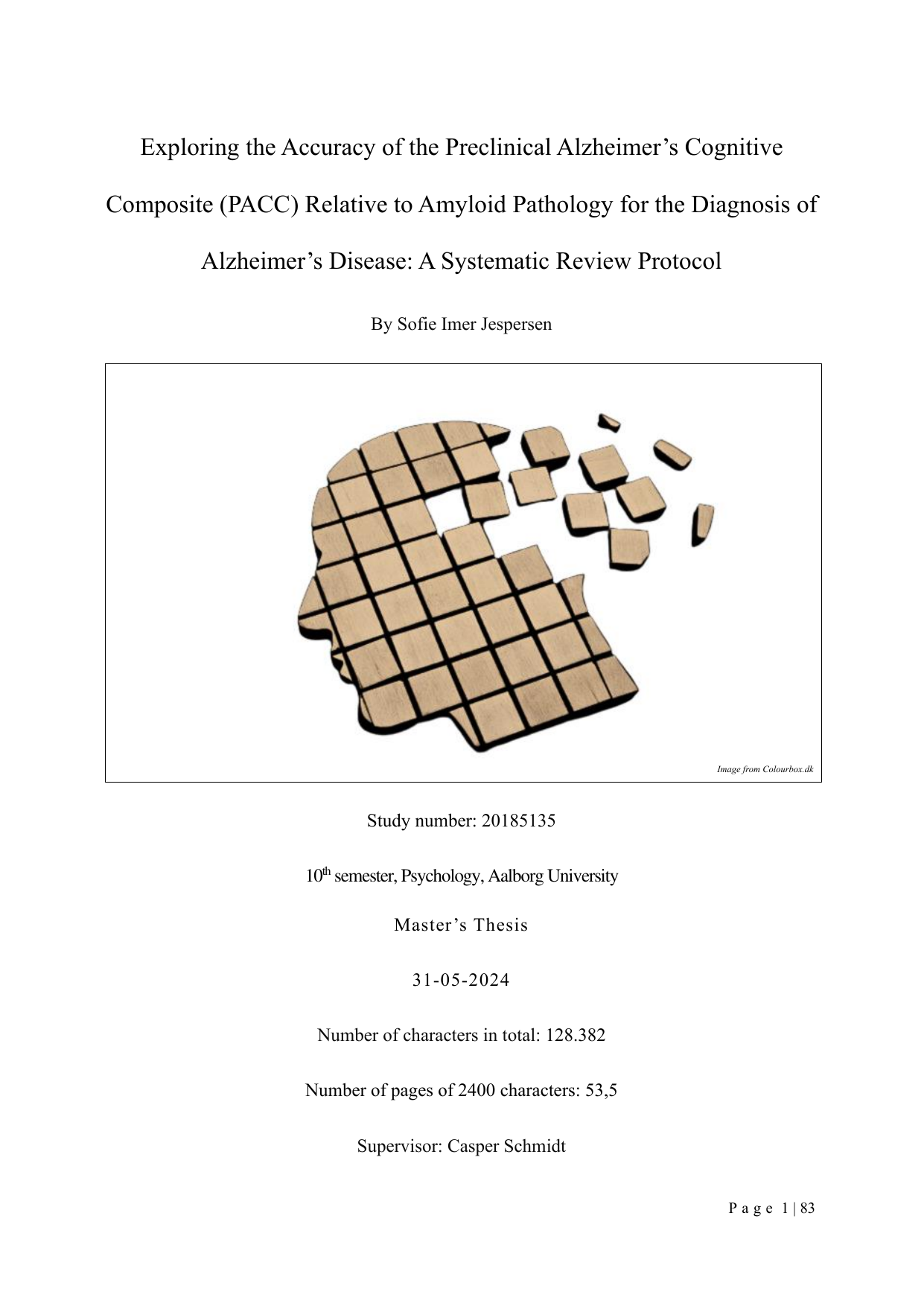
Exploring the Accuracy of the Preclinical Alzheimer's Cognitive Composite (PACC) Relative to Amyloid Pathology for the Diagnosis of Alzheimer's Disease: A Systematic Review Protocol: What is the diagnostic accuracy and sensitivity of the Preclinical Alzheimer’s Cognitive Composite (PACC) for detecting preclinical Alzheimer’s Disease, compared to amyloid-PET imaging amongst people with elevated amyloid pathology?
Author
Term
4. term
Education
Publication year
2024
Submitted on
2024-05-30
Pages
53
Abstract
Background: Preclinical Alzheimer’s Disease (AD) can be defined by an abnormally high level of amyloid pathology (Aβ) in the brain. The need for earlier discovery of the disease increases, as the AD prevalence is rising globally. The Preclinical Alzheimer’s Cognitive Composite (PACC) is a compilation of neuropsychological tests specifically designed to detect the earliest symptoms of preclinical AD. Methods: The current study consists of a comprehensive systematic review, investigating PACC and its sensitivity across 20 studies. The review is based on the Preferred Reporting Items for Systematic Reviews and Meta-Analyses (PRISMA) and Diagnostic Test Accuracy (DTA) protocol by Joanna Briggs Institute (JBI). The DTA protocol suggests comparing the index test (PACC) to a consistent reference test (Aβ-PET imaging). The sensitivity, accuracy and specificity were investigated across all reviewed studies. Results: Present findings add to profound evidence that even very low levels of Aβ-PET levels are associated with subtle cognitive changes as measured by PACC. And a higher level of Aβ leads to a faster rate of cognitive decline. Across different versions of PACC, it was found that especially the Mini Mental State Examination (MMSE) and Digit Symbol Substitution Test (DSST) subtests were highly sensitive towards early cognitive change due to preclinical AD. Additional subtests measuring language, like the Category Fluency Test (CAT), could potentially enhance the overall sensitivity of PACC. Furthermore, PACC can detect cognitive changes in both early and late stages of onset AD, and it can differentiate between preclinical AD, Mild Cognitive Impairment (MCI), and AD, which makes it a great and highly sensitive assessment tool both in clinical trials and clinical settings. Limitations: The limitations in this study include potential biases inherent in the selected studies, such as selection and attrition biases, which may affect the generalizability of the findings. Additionally, the reliance on specific subtests within PACC may not capture all aspects of cognitive decline, and the inclusion of additional subtests requires further validation. Conclusion: The included studies find that elevated Aβ levels puts you at higher risk of developing cognitive decline and possibly AD. This also underlines the importance of Aβ as one of the first pathological biomarkers to appear on a trajectory to developing AD. However, further evidence is needed to fully verify the causal relationship between Aβ pathology and cognition, and to validate PACC for clinical settings. Keywords: Preclinical Alzheimer’s Disease, Amyloid-pathology (Aβ), Amyloid-PET, Preclinical Alzheimer’s Cognitive Composite (PACC), Cognitive Decline, Diagnostic Test Accuracy, Systematic Review
Background: Preclinical Alzheimer’s Disease (AD) can be defined by an abnormally high level of amyloid pathology (Aβ) in the brain. The need for earlier discovery of the disease increases, as the AD prevalence is rising globally. The Preclinical Alzheimer’s Cognitive Composite (PACC) is a compilation of neuropsychological tests specifically designed to detect the earliest symptoms of preclinical AD. Methods: The current study consists of a comprehensive systematic review, investigating PACC and its sensitivity across 20 studies. The review is based on the Preferred Reporting Items for Systematic Reviews and Meta-Analyses (PRISMA) and Diagnostic Test Accuracy (DTA) protocol by Joanna Briggs Institute (JBI). The DTA protocol suggests comparing the index test (PACC) to a consistent reference test (Aβ-PET imaging). The sensitivity, accuracy and specificity were investigated across all reviewed studies. Results: Present findings add to profound evidence that even very low levels of Aβ-PET levels are associated with subtle cognitive changes as measured by PACC. And a higher level of Aβ leads to a faster rate of cognitive decline. Across different versions of PACC, it was found that especially the Mini Mental State Examination (MMSE) and Digit Symbol Substitution Test (DSST) subtests were highly sensitive towards early cognitive change due to preclinical AD. Additional subtests measuring language, like the Category Fluency Test (CAT), could potentially enhance the overall sensitivity of PACC. Furthermore, PACC can detect cognitive changes in both early and late stages of onset AD, and it can differentiate between preclinical AD, Mild Cognitive Impairment (MCI), and AD, which makes it a great and highly sensitive assessment tool both in clinical trials and clinical settings. Limitations: The limitations in this study include potential biases inherent in the selected studies, such as selection and attrition biases, which may affect the generalizability of the findings. Additionally, the reliance on specific subtests within PACC may not capture all aspects of cognitive decline, and the inclusion of additional subtests requires further validation. Conclusion: The included studies find that elevated Aβ levels puts you at higher risk of developing cognitive decline and possibly AD. This also underlines the importance of Aβ as one of the first pathological biomarkers to appear on a trajectory to developing AD. However, further evidence is needed to fully verify the causal relationship between Aβ pathology and cognition, and to validate PACC for clinical settings. Keywords: Preclinical Alzheimer’s Disease, Amyloid-pathology (Aβ), Amyloid-PET, Preclinical Alzheimer’s Cognitive Composite (PACC), Cognitive Decline, Diagnostic Test Accuracy, Systematic Review
Keywords
Documents
